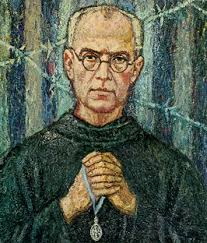HOMILY WEEK 19 06 – Year I
Faith – Beyond Happiness to Joy:
Memorial of St. Maximilian Kolbe
(Jos 24:14-29; Ps 16; Mt 19:13-15)
***************************************
Some time ago I learned of the book The Happiness Trap, a title that intrigued me. As I suspected, the book affirms that the pursuit of happiness doesn’t really work, but falls short of leading the reader into joy.
The readings today invite us into a profound childlike faith in God leading us on a path of life that will fill us with the “fullness of joy” (Psalm 16).
It begins with the first reading in which Joshua, near the end of his life as successor to Moses and after leading the people into the promised land, challenges them to a mature faith and trust in God and God alone. Over and over, knowing as he does the fickleness of their lives, he drives home the need to revere the God of their ancestors, to serve God alone, and to put away the false gods their ancestors fell for “beyond the River and in Egypt.”
Those false gods, always so attractive and tempting, are the same false gods seducing us today – possessions and pleasure, prestige and fame, power and control. The Israelites always wanted land, money, kings and glory, just like the other nations. It is not that these things are bad in themselves – it is just that we, in our insecurity and weak faith, tend to over-attach to these childhood (read childish) programs for happiness which if not met by genuine unconditional love, lead us to over-identify and over-attach to them, to the point of addiction, at which point they become false gods in our lives.
After seemingly convincing the people to “incline their hearts to the Lord, the God of Israel,” Joshua made a covenant, complete with statues and ordinances (almost like a repeat of Moses on Mt. Sinai) and even set up a large stone under an oak tree as a witness. In so doing, he was very much along the line of Indigenous spirituality, with its respect for asiniyak, rocks, that can hear what is said and see what transpires.
Unfortunately, we know that subsequent centuries revealed that commitment of the people to be more superficial than heartfelt, as the institutional temple cult of the religious leaders became more and more corrupt and hypocritical.
Doug, who as a young man had considered religious life, married someone he thought agreed with his desire to live a simple life-style, only to find out years later, when she left him, that her hidden wish was for lots of wealth, a big house, and a flashy car, and when that was not forthcoming, she was gone. Her marital commitment was superficial and insincere, like the Israelites, and she also succumbed to those false gods.
In the gospel, Jesus adds the dimension of childlikeness to our faith in God. A child is innocent, humble, transparent, without guile, trusting to a fault, and totally dependent on parents for love and life. I am always delighted to see how children are fearlessly trusting as they are thrown up into the air, totally sure they will be caught on the way down. That is the kind of relationship Jesus wants us to have with the Father.
The fact that the disciples “sternly admonished” those who were bringing their children to Jesus is a painful reminder of how a too rigid and judgmental pastoral practice can actually drive people away from church. Fr. Tom Ogg who is on the US ecclesial team for WWME gave me a booklet on clericalism they produced to support Pope Francis in his attempt to lessen the degree of clericalism in the church. It is well researched, but the most powerful element of the booklet is the true incidents and stories of clericalism it describes, such as one priest declaring to his parishioners that he was king of that parish.
What these readings invite us to is a mature faith, secure in God’s love for us, that will live out the words of Psalm 16: We will bless the Lord who is our refuge, who is always before us. We will never be moved by those false gods, and our souls will rejoice, for God will show us the right path of life, and in God’s presence we will find the fullness of joy.

St Maximillian Kolbe
The church honors today someone who lived these readings to the full. St Maximillian was born in Poland in 1894. As a Franciscan, he worked to spread the Gospel in his native Poland as well as Japan. He had a great devotion to and promoted the veneration of the Blessed Virgin Mary. He was strongly influenced in 1906 at the age of 12, by a vision of the Blessed Virgin Mary. Maximillian founded and supervised the monastery of Niepokalanów near Warsaw, operated an amateur radio station and founded or ran several other organizations and publications. During the Nazi occupation of Poland, he helped thousands of refugees, including Polish Jews. He was arrested by the Gestapo in 1941 and imprisoned at Auschwitz. Three months after Maximillian’s arrival, a prisoner escaped. In retaliation, 10 men were chosen at random to die. One was a young father; Maximillian offered to take his place. His offer accepted, Maximillian died on this day in 1941 and was canonized in October 1982. I believe the young father he saved was present at his canonization ceremony.
The Eucharist is an intimate family meal with the one true God whose unconditional love for us was revealed by Jesus his only Son, our Lord. Through Word and Sacrament, we are forgiven, healed, nourished, and sent out to share that love of God with others as the way to true lasting joy transcending any temporary happiness.



